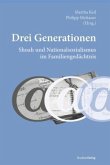This volume demonstrates how an appropriate perception of the Holocaust in the Arab world can be distorted through the colonial legacy. Whereas the Holocaust has become a central point in European history, in the Arab world these events were felt only marginally. This limited field of vision took place against the background of the problem of Palestine or within the scope of the relationship of Arab nationalists to National Socialism. Omar Kamil follows a dialogue-based historical concept by comparing texts of Arnold Toynbee, Jean-Paul Sartre and Maxime Rodinson with those of the Arab world in the 1960s. He shows that a proper perception of the Holocaust in the Arab world has been distorted by the colonial experience in these countries.
Perlentaucher-Notiz zur NZZ-Rezension
Der Erinnerung an den Holocaust in der arabischen Welt eine recht neutrale Studie gewidmet zu haben, das ist für Joseph Croitoru das nicht unerhebliche Verdienst des Autors Omar Kamil. Sein Buch versteht sich auch mehr als Diskursgeschichte. Dass Kamil sich zudem auf die Jahre 1945-1967 beschränkt, hält der Rezensent für einen weiteren Pluspunkt, schafft es doch Tiefenschärfe. Gut für die Analyse scheint Croitoru ferner der komparative ideengeschichtliche Ansatz, der für ihn die Eigenheiten des arabischen Diskurses über den Holocaust zu betonen imstande ist. Zwar zeigt insbesondere Kamils Darstellung von Sartres Engagement im israelisch-arabischen Konflikt laut Croitoru vermeidbare Längen, insgesamt jedoch scheint ihm der Band eine lohnende Lektüre zu sein.
© Perlentaucher Medien GmbH
© Perlentaucher Medien GmbH


